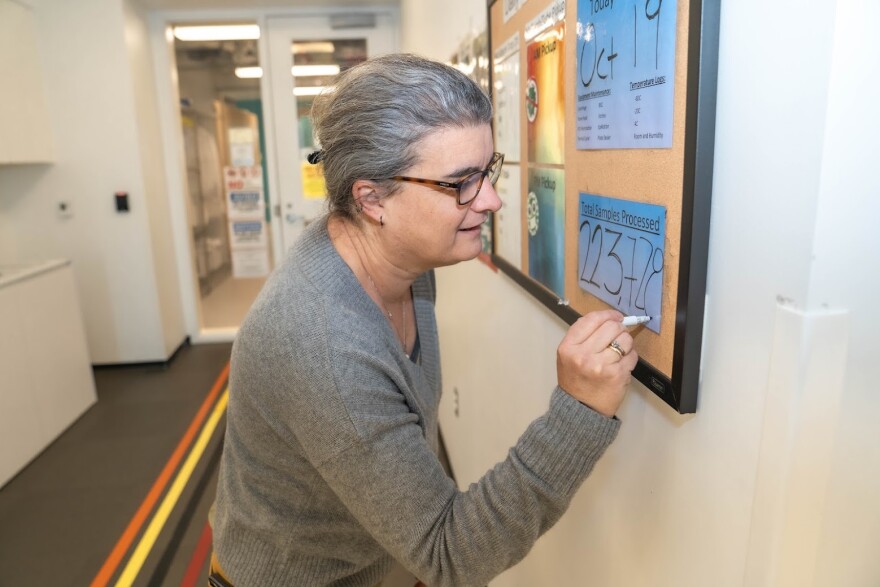Behind a glass window at Virginia Tech’s Fralin Biomedical Research Institute in Roanoke is a bright, white space. Inside, a researcher in a lab coat shuffles around.
“So we have three robots, we have 18 PCR machines,” describes the lab’s director, Dr. Carla Finkelstein, standing on the other side of the glass.
As more Virginians have become vaccinated against COVID-19, testing for the virus isn’t as frequent. But at the height of the pandemic, testing was a vital way to control the spread of the virus. And, this lab in southwest Virginia played a crucial role in making that testing accessible.
During the height of the pandemic scientists here were processing between 1,600 and 2,000 COVID tests a day. Today, that’s no longer the case, but the hallways are still covered with signed photographs of the folks who work here.
“These are the guys that actually did all the great job,” Finkelstein says. “At one point we were at 50,000 and we thought at that time that would be a lot. And here’s where we are now. Almost a quarter million.”
The lab has processed almost a quarter million tests since April 2020.
As people were deciding whether they were sick and whether to isolate themselves from loved ones or go to work, researchers here were working day and night to provide quick results to people all over southwest Virginia.
A freight service drove the long miles, picking up used swabs from as far away as Lee County, then dropping them off each night at the building in Roanoke. At 6 am each day, the scientists got to the lab and started processing. They’d have the results out to health departments by the end of the day.
They even had to develop their own technology that would provide reliable results, even when samples were coming from remote geographic locations.
“As basic scientists, there are not many opportunities in our life where we see the impact of our research in our community,” Finkelstein says. “So, when this mess started and everybody spontaneously came together to help; that’s the peak of my career.”
Well, maybe not the peak, she amends. Finkelstein is primarily a cancer researcher and still plans on finding a cure. As testing has slowed down she’s been able to shift her focus back to that pre-pandemic work, but others in the lab haven’t totally switched gears yet.
Now they’re working on genomic sequencing for COVID variants.
Instead of processing hundreds of spit or nasal swabs a day for a simple positive or negative COVID result, now the lab is analyzing those samples for unique genomic sequences. The samples they’re analyzing come from hospitals, nursing homes and other institutions all over the state.
Researchers are looking for mutations that could help the virus bypass our immune systems or make it more transmissible. Work like this is already common for other viruses.
“It’s like a flu, right?” Finkelstein explains. “So, every year you kind of try to predict which one is the new variant that’s going to pop up the following year, so you get a vaccine based on that prediction. And if that is the variant that pops up, then you are protected.”
New variants are to be expected, says Finkelstein, and so as long as work like this is happening across the country hopefully scientists and health officials can help us stay ahead of any problems. It’s preventative work.
“The best thing that could happen is not to be in the news. That means that everything is going smoothly,” Finkelstein says. “You’re doing your job, it’s working, we get a vaccine, nothing happens.”
The latest variant, BQ1, has already shown up in Virginia. Finkelstein’s lab is still monitoring whether this variant could cause a new wave of infections.
This report, provided by Virginia Public Radio, was made possible with support from the Virginia Education Association.

